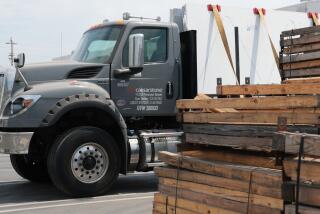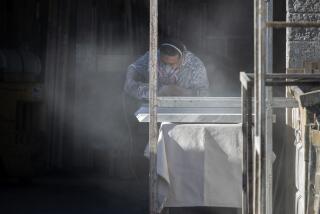Battle intensifies over proposed Temecula rock quarry
A giant rock quarry proposed in the hills above Temecula had politicians from one of the most conservative corners of the Inland Empire railing Monday against corporate arrogance and environmental devastation, while union workers pushed the project as a job creator.
The political twists are intensifying as the five-year-long controversy over the Liberty Quarry barrels toward a vote before the Riverside County Board of Supervisors, which on Monday held the first of two days of public hearings in a packed convention center ballroom.
Hundreds of union members clad in green T-shirts were bused from across Southern California to rally and testify in favor of the quarry, touting the 99 high-paying jobs that the rock mine would bring to the recession-battered Inland Empire.
Temecula Mayor Chuck Washington countered that blasting and dust from the mine would poison the Temecula Valley’s air and devastate the region’s wineries and tourist-dependent economy, increasing unemployment.
“It’s not a partisan issue. It’s not about being Republican or Democrat,” Washington said. “It’s about protecting the good jobs we already have ... and preserving quality of life. It’s that simple.”
Washington said a yet-to-be-released health study sponsored by the city will show that the quarry would lead to 146 additional deaths in the Temecula Valley, many respiratory-related: “It’s tantamount to being a friend of cancer,” he said.
Gary Johnson of Granite Construction, the Watsonville-based firm proposing the quarry, called Washington’s allegations ludicrous.
The Southern California Air Quality Management District determined that the rock mine would reduce highway truck traffic, ultimately improving regional air quality, he said, adding that all studies have concluded that the mine will not endanger the health of residents in surrounding communities.
“This is the right project, in the right place, at the right time,” he told the supervisors, saying the quarry would bring in $300 million in sales tax over the life of the mine as well as create hundreds of indirect jobs.
Granite’s proposed 414-acre quarry, which looms over Interstate 15 on a peak on the San Diego County border, would yield about 270 million tons of granite over 75 years, leaving behind a hole 1,000 feet deep and a mile long.
In September, the Riverside County Planning Commission rejected the application amid strong opposition from Temecula and the Pechanga Band of Luiseño Indians, which has a four-star casino resort nearby and considers the mountain sacred. Granite appealed that decision to the five-member board of supervisors.
More than two-thirds of the aggregate mined from the site would be trucked to San Diego County, where mining permits are tough to come by, a point not lost on several members of the Temecula City Council on Monday.
“Why should Riverside County sacrifice one of its most sensitive and pristine natural areas to feed San Diego’s aggregate demand?” Councilman Mike Naggar asked.
Most of the testimony Monday came from mine supporters, including council members from the nearby cities of Perris and Menifee.
Union member Ray Wetmur, from Corona, drove over with other members of his Laborers’ International Union of North America 1184. Wetmur, 38, said he’s been out of work for three years.
“We’re talking about jobs, about putting people back to work,” Wetmur said. “This is a job I could get.”
Opponents of the mine, many in neon-orange shirts, were bused from Temecula and are expected to return to offer testimony next Monday, the second day of hearings.
Among them was Bob Alkema, who lives within sight of the mountain Granite wants to mine. “They’re misrepresenting the facts,” Alkema said as others testified. “They’re a billion-dollar corporation that wants its way. People in Temecula want their pristine hillsides the way they are.”
Pechanga tribal chairman Mark Macarro told the supervisors Monday that the mountain is part of a range where the Luiseño people believe life was created, therefore making it a sacred place.
“You have a moral decision to make,” he told the supervisors. “It’s one based on respect for religion and ancient history.”
More to Read
Sign up for Essential California
The most important California stories and recommendations in your inbox every morning.
You may occasionally receive promotional content from the Los Angeles Times.











